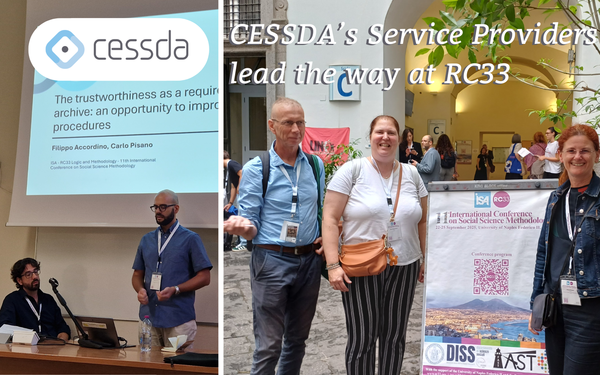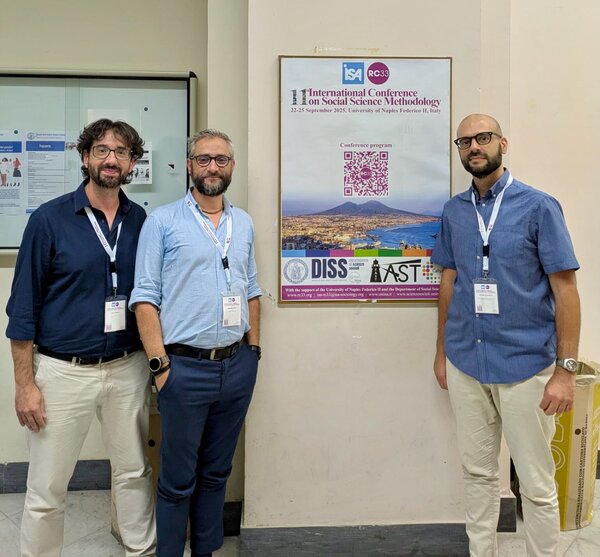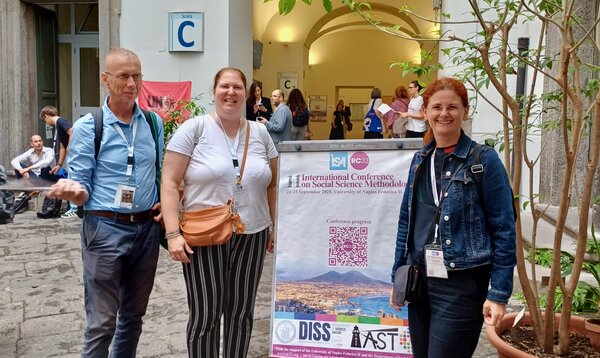
CESSDA’s Service Providers lead the way at 11th International Conference on Social Science Methodology
DASSI and ADP, CESSDA’s Italian and Slovenian Service Providers, participated in the 11th International Conference on Social Science Methodology, organized by the International Sociological Association’s (ISA) research committee RC33 on Logic and Methodology. From 22 to 25 September, the international conference took place at the Federico II University of Naples.
The conference brought together scholars from across the social sciences to discuss epistemological, theoretical, and methodological challenges in contemporary research. Sessions covered topics such as open science and research infrastructures, digital and “sociodigital” methods, creative methodological approaches (e.g. arts-based methods, queer methods), integration of survey and trace data, ethics in qualitative research, and the measurement and comparison of social and political values in turbulent times.
A featured panel, “Embracing Open Science: Methodological and Epistemological Challenges in Research Infrastructures,” examined the opportunities and risks posed by digital infrastructures, data sharing, and the evolving practices of Open Science. The session fostered discussion on how research infrastructures are transforming social science methodology, from ensuring data validity and representativeness to shaping new practices in research design, management, and dissemination.
It was under this panel that several CESSDA Service Providers, including DASSI (Italy) and ADP (Slovenia), presented their work, showcasing national initiatives and innovative approaches to implementing Open Science and FAIR data principles.
DASSI’s Carlo Pisano led Workshop 3, entitled “Research Data Management in the social sciences: from theory to practice”. Aimed particularly at young researchers and PhD students, the workshop offered an overview of Research Data Management and FAIR principles, illustrating some rules for creating a Data Management Plan and providing suggestions for sharing research data.

Carlo Pisano, Domingo Scisci, and Filippo Accordino, from DASSI.
Furthermore, DASSI participated in the Conference through various contributions. DASSI's experience in preparing the application for CoreTrustSeal certification was illustrated in the session “Embracing Open Science: Methodological and Epistemological Challenges in Research Infrastructures for the Social Sciences”, with a contribution entitled “The trustworthiness as a requirement for a data archive: an opportunity to improve tools and procedures”, presented by Filippo Accordino and Carlo Pisano. The contribution aimed to reflect on the concept of trust in the context of data archives for the social sciences, and on the opportunity provided by the CoreTrustSeal certification application to improve and clarify organisational, operational, and technical aspects in the construction of the Italian archive.
For us, this was a chance to share the research activities carried out at DASSI in a conference that focuses on the methodological aspects of research, and to promote the opportunities offered by the CESSDA-ERIC infrastructure, especially among PhD students and young researchers, said Filippo Accordino after the conference had ended.
Another contribution, presented by Domingo Scisci and Giovanna De Santis, addressed the Data as Code paradigm in research data management. Their presentation “Beyond Monkey Jobs: Leveraging a “Data as Code” Approach for Efficient and FAIR Research Data Management” illustrated how software development methodologies, combined with programmatic tools and artificial intelligence, can enhance reproducibility, transparency, and efficiency in line with Open Science and FAIR principles. Drawing on case studies from DASSI, they showed how code-based workflows reduce repetitive manual tasks, improve data quality and preservation, and allow professionals to focus on higher-value activities.
ADP highlights Slovenia’s leadership in FAIR data, Open Science, and privacy management
Also representing CESSDA at RC33 was ADP, the Slovenian Social Science Data Archive, who delivered a strong presence with three presentations, each showcasing Slovenia’s commitment to advancing Open Science and FAIR data principles.
In “Unlocking Research Potential: The Role of Data Repositories in Supporting Researchers and Data Stewards,” Irena Vipavc Brvar highlighted how data repositories are not merely storage facilities but active enablers of FAIR data practices. Drawing on the SPOZNAJ project, she outlined Slovenia’s progress in data stewardship training, the development of a Catalogue of Competences for Data Experts, and the creation of the Slovenian Data Stewardship Network, all contributing to a robust national framework for Open Science.
In “FAIR Social Science Data Enhancement,” Janez Štebe explored practical pathways to increase the FAIRness of both data and metadata, particularly through standardised vocabularies, interoperability frameworks, and common coding practices. His contribution underscored the value of training researchers in best practices that enhance comparability and reusability, supported by CESSDA tools such as the European Language Social Science Thesaurus and the European Question Bank. By integrating FAIR-compliant vocabularies and shared data handling code, repositories can boost the reusability and long-term impact of social science data.

Janez Štebe, Irena Brvar, and Sonja Bezak from ADP at the conference in Napoli.
Finally, in “Anonymization and Privacy Management in Social Science Data Archives: The Slovenian Case,” Sonja Bezjak presented ADP’s approach to managing sensitive data under GDPR and national legislation. Emphasising the principle “open as much as possible, closed as necessary,” she detailed the archive’s procedures for anonymisation, legal compliance, and risk assessment, supported by case studies from international research projects. Her presentation showcased how data archives balance openness and privacy while ensuring data integrity and reuse potential.
Together, these contributions reflect ADP’s holistic approach to Open Science – combining technical FAIR implementation, capacity building, and robust privacy management to support researchers and strengthen the European data infrastructure landscape.
Program: see https://rc33.org/11icssm-program/
Read the full abstracts for the contributions:
Session: Embracing Open Science: Methodological and Epistemological Challenges in Research Infrastructures for the Social Sciences. Chairs: Luciana Taddei, Paolo Landri and Caterina Ambrosio
The trustworthiness as a requirement for a data archive: an opportunity to improve tools and procedures
Filippo Accordino, Daniela Luzi, Carlo Pisano and Fabrizio Pecoraro
ABSTRACT. Data sharing and re-use in the social sciences are practices that are facilitated by the availability of specialised research infrastructures, in particular the data archives. One of the main issues concerning data archives is trust within the scientific community, due to their role as intermediaries between researchers. Under this perspective, data depositors need to be guaranteed that their data will be cared for and accessed in a stable and secure manner, while data users need to be confident to access data easily and in a documented way to reuse it correctly. Based on this assumption, it is interesting to explore how data archives address the issue of trustworthiness towards their community. Trust is a broad concept that often overlaps with quality, validity, and reliability. How can it be measured? And how can an archive demonstrate its reliability to researchers? The acquisition of a “seal of approval” by a research infrastructure demonstrates its reliability. It certifies that the procedures followed for the acquisition, management, and long-term preservation of data meet high-quality standards. This also requires a technologically secure environment as well as skilled human resources qualified to operate the service. All of these requirements enhance the repository reputation and attractiveness to researchers and contribute to determining its ability to become a reference point for the scientific community for both data deposit and re-use. The proposed paper presents the path taken by the Data Archive for Social Sciences in Italy (DASSI) to obtain the quality certification issued by CoreTrustSeal, the certification approach recommended within the European Open Science Cloud (EOSC) and selected by CESSDA ERIC for its members. In particular, the paper reflects on the concept of “trust” and its implications for a research infrastructure, highlighting its impact on tasks and roles and focusing on key aspects to meet trustworthiness requirements.
Beyond Monkey Jobs: Leveraging a ‘Data as Code’ Approach for Efficient and FAIR Research Data Management
Domingo Scisci and Giovanna De Santis
ABSTRACT. The growing complexity of research data infrastructures presents both opportunities and challenges for social science research. A persistent hurdle is the burden of repetitive, error-prone data management tasks that consume valuable time and resources. The ‘Data as Code’ (DaC) paradigm offers a transformative solution by applying software development methodologies to research data management. This approach enhances reproducibility, efficiency, and transparency, aligning with the Open Science and the FAIR (Findable, Accessible, Interoperable, and Reusable) principles for digital research infrastructures, thereby fostering methodological rigor and innovation. This presentation explores the integration of programmatic tools, artificial intelligence, and the DaC approach within social science data infrastructures, contributing to ongoing discussions on the future of research data management while providing practical insights for researchers and data archivists to improve data usability and long-term preservation. Through case studies from the Data Archive for Social Sciences in Italy (DASSI) — the Italian Service Provider of CESSDA ERIC — we demonstrate how these methodologies improve data quality, reproducibility, and long-term preservation. By reducing manual interventions and enhancing data curation processes, this approach minimizes human error and bolsters data archiving, accessibility, and interoperability, thereby allowing professionals to dedicate more time to critical, high-value tasks. By embracing the Data as Code paradigm, research infrastructures can move beyond traditional matrix-based data structures, enabling seamless integration and management of diverse data formats.This flexibility ensures that heterogeneous datasets — ranging from hierarchical and nested data to unstructured sources — can be seamlessly integrated, curated, and disseminated, expanding the scope and potential of social science research.
Session: Breaking up the Narrative: Addressing the Quality and Applicability Challenges of Open Government Data
Chairs:Sonia Stefanizzi, Federico Pilati and Fabio Gaspani
Open, But Not Always Usable: Tackling Quality Challenges in Government Data
ABSTRACT. Despite the growing emphasis on Open Government Data (OGD) as a driver of transparency, innovation, and data-driven policymaking, its practical usability remains limited by persistent quality and applicability challenges. The project “Open Government Data: Understanding Society Through Public Administration Data” - funded by the Italian Ministry of University and Research for the period 2023–2027, under Grant No. 15659 dated 28/12/2022 - aims to bridge this gap by developing systematic approaches to validate, document, and merge public datasets for enhanced accessibility and research utility. This presentation will discuss key findings from the project, focusing on: Data Validation and Documentation – Addressing the lack of metadata, inconsistent formats, and outdated datasets through structured validation workflows; Merging and Standardizing Data – Overcoming fragmentation by integrating data from multiple sources (local, regional, national) using a Data as Code framework; Enhancing Accessibility and FAIR Compliance – Implementing machine-readable, API-accessible social indicators to ensure usability for both policymakers and researchers. Through case studies and practical examples, this talk will illustrate how methodological innovations—such as data source validation, JSON-structured metadata, and API-driven dissemination—can improve the reliability and impact of OGD. By aligning technical strategies with the principles of openness and transparency, we can move beyond the narrative of OGD’s potential and focus on making it a truly actionable resource for public good.
Session: Unlocking Research Potential: The Role of Data Repositories in Supporting Researchers and Data Stewards
The Open Science movement is transforming the research landscape, with funders such as the European Commission mandating transparency and accessibility in research. Researchers must now publish not only their findings but also their datasets and software in trusted repositories, ensuring that research outputs are FAIR—Findable, Accessible, Interoperable, and Reusable. Data Management Plans (DMPs) play a critical role in supporting these practices by promoting structured data handling and sharing. However, the successful implementation of Open Science principles relies on the services and infrastructure provided by data repositories. Repositories are more than storage spaces; they actively facilitate FAIR data practices by offering tools for metadata standardization, persistent identifiers, interoperability frameworks, and long-term preservation strategies. They also support researchers and data stewards in navigating evolving Open Science requirements, ensuring compliance with institutional and funder policies.
A key example of this support is Slovenia’s SPOZNAJ project, which aligns with broader European Open Science developments. Slovenia has enacted significant legislative changes in the last four years. New policies mandate open access to research results, responsible evaluation of research work, and citizen engagement in research activities. To strengthen data stewardship and FAIR data management, the SPOZNAJ project consortium launched a data stewardship training program in 2024. This initiative began with the Catalogue of Competences for Data Experts, forming the basis for a three-week training program. In addition to publishing two handbooks on Open Science and Research Data Management Planning in Slovenian, the project also established the Slovenian Data Stewardship Network.
This presentation highlights how repositories, national initiatives, and institutional support can enhance research data management, accelerate the adoption of FAIR principles, and ensure the long-term success of Open Science.
Anonymization and Privacy Management in Social Science Data Archives: The Slovenian Case
The preservation and sharing of social science data is well established, with domain-specific data archives operating and evolving since the 1970s. Today, 23 Member States and 11 partners are associated with the Consortium of European Social Science Data Archives (CESSDA). Slovenia has been a member of CESSDA since 1997, with the Social Science Data Archives at the University of Ljubljana (ADP) serving as the service provider. ADP provides selection and permanent curation of quality data from the Slovenian research landscape and provides access to these data for target communities.
Research involving sensitive data, such as special categories of personal data, is particularly challenging and labour-intensive. During the acquisition process, ADP determines whether the research meets the requirements of the GDPR and national legislation and assesses the potential usability of the data. In doing so, it follows the principle: “open as much as possible, closed as much as necessary.”
This presentation describes the process by which ADP takes over material from researchers, verifies compliance with legal requirements, assesses the risk of disclosure of research participants, and applies safeguards such as anonymisation and restricted access to data (e.g. safe room environment). During this process, ADP assesses the quality of the material received, considering methodology, sampling, integrity of the material, and its potential for reuse by different audiences. Dilemmas and solutions are illustrated by two international research projects involving sensitive personal data.
The social science data archives associated with CESSDA play an important role in implementing the principles of Open Science, particularly the FAIR principles. Their special value for the social sciences lies in ensuring the continuous development of infrastructure and services tailored to target users, and in building high-quality datasets for future research.
FAIR Social Science Data Enhancement
Research data infrastructures aiming to improve FAIR principles often focus on enhancing metadata. However, most FAIR principles apply to both data and metadata. Interoperability aspects, in particular, can be emphasised, such as standardised knowledge representation, the use of FAIR-compliant vocabularies, and explicit references to other data (Bahim et al. 2020).
This presentation discusses areas of data planning and processing that can make data more FAIR. Enhancing FAIRness increases the overall reusability and analytic potential of data, including the possibilities of merging and combining different data sources. It is important to train researchers in established best practices that increase reusability (e.g. http://www.dlib.si/?URN=URN:NBN:SI). For example, comparability of data and conceptual clarity can be improved by using standard social science variables. Standard social science classifications can be derived using shared computer code (see https://www.gesis.org/en/missy/materials/EU-SILC/tools/datahandling).
Data infrastructure services are often asked for advice regarding Data Management Planning, which requires maximising FAIR aspects. Historical research projects that use printed archival resources from the past (Mezzoli, 2022, https://doi.org/10.17898/ADP_HDS47_V1) have unified the coding framework from different periods and locations. The variable operationalisations from key social science studies have known reliability and validity characteristics, which the CESSDA European Question Bank, with full survey question text in DDI format, will provide. The use of FAIR-compliant vocabularies, such as the European Language Social Science Thesaurus, to document the conceptual content of data at a granular level can add an additional layer of FAIRness (see https://www.cessda.eu/Tools).
In conclusion, a higher return on investment can be expected by publishing FAIR-compliant data (Inau et al. 2023, https://www.jmir.org/2023/1/e45013). Repositories can establish evaluation criteria for data that respect different aspects of FAIR data (e.g. https://pubmet2024.unizd.hr/janez-stebe-abstract/).